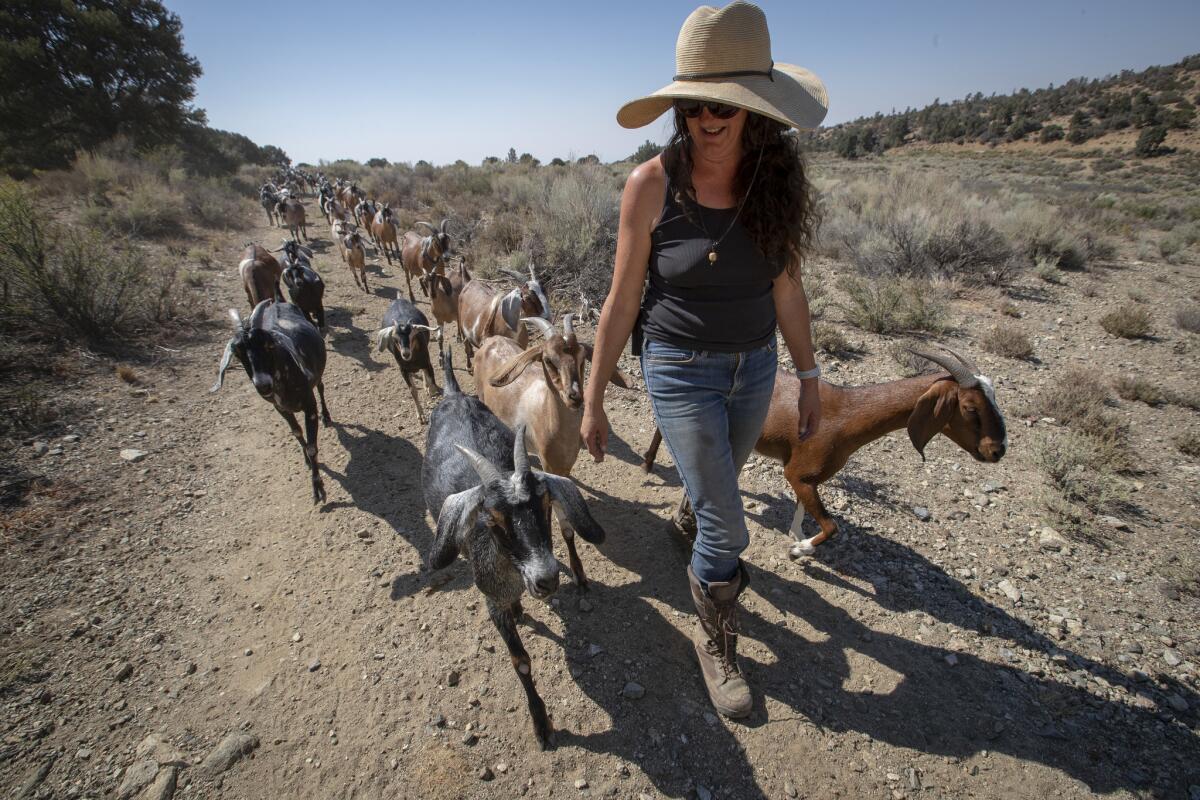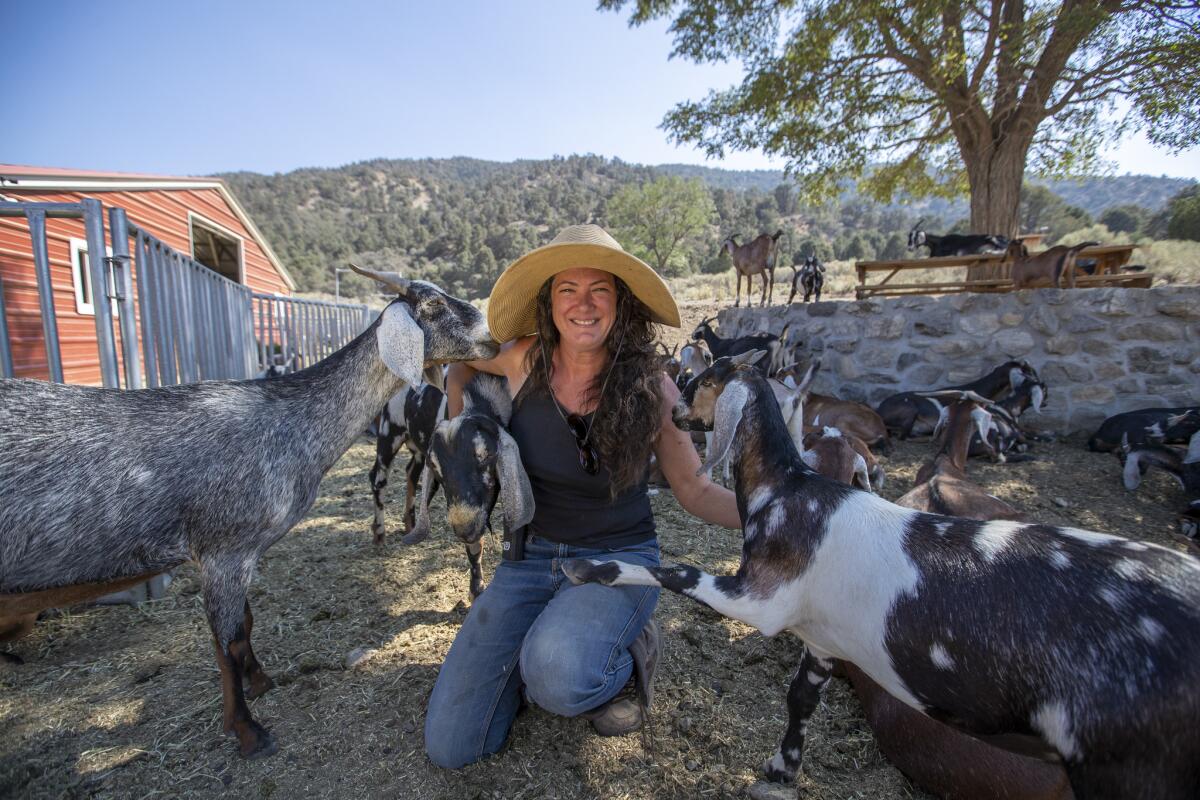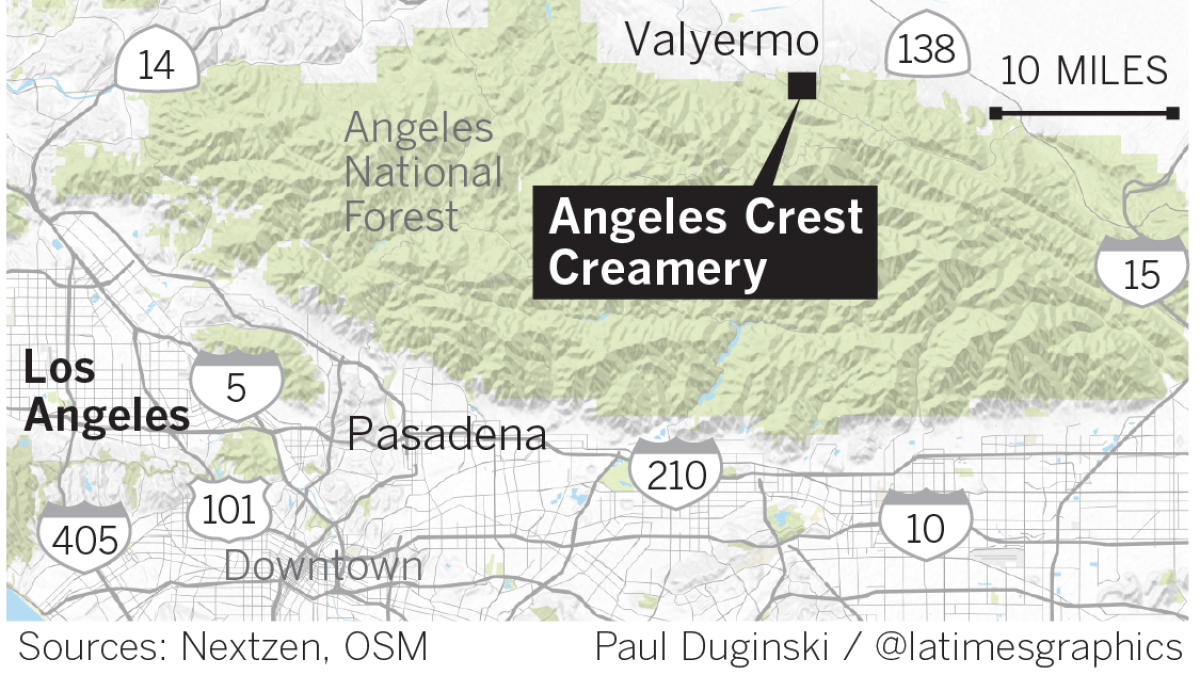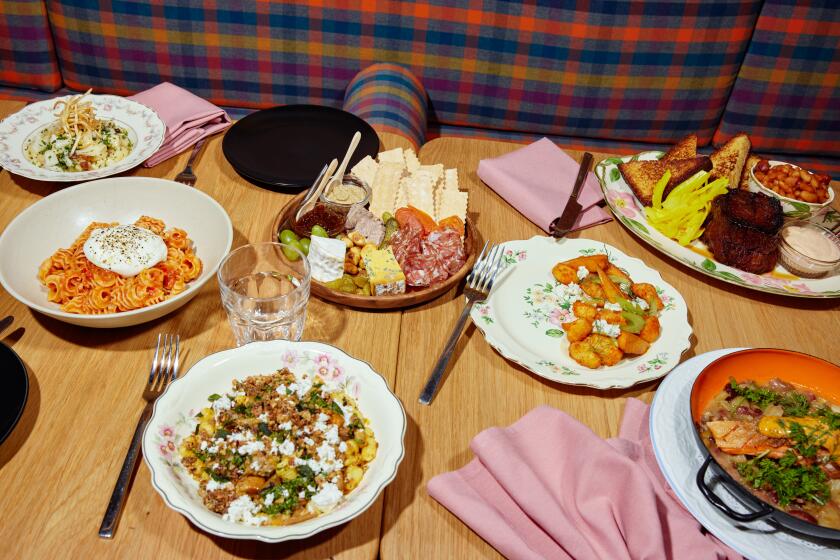A physicist-turned-farmer left L.A. for a mountain getaway. You can visit for goat cheese and <em>cajeta</em>

- Share via
A mile high in the San Gabriels, on the far northern edge of the Angeles National Forest — about 1,000 square miles of looming mountains that fill the horizon northeast of downtown Los Angeles — a herd of Nubian goats forages amid the chaparral. It’s a small herd, as herds go, about 60 goats rustling through sagebrush and desert almond, buckwheat and scrub oak trees.
Gloria Putnam is the goatherd of this motley tribe, and she walks among them, picking mistletoe tangled in an oak to feed the matriarch of the herd, an 11-year-old named Rosie. Piñon Ridge rises above them, bandaged with clouds. A trim red barn in the distance is the only spot of color.
Beyond a cluster of low trees is the newly remodeled cabin where Putnam lives with her partner, Christian Sariol, and their two dogs, and where Putnam and Sariol headquarter Angeles Crest Creamery, their cheesemaking and farmstay project.
Putnam, 46, did not set out to be a goatherd. A tall, slender woman with an untamed mane of curly brown hair, she herds her goats sporting an enormous sun hat and designer sunglasses, tall boots constructed to ward off rattlesnakes and a radio hooked onto her jeans.
Although she didn’t know it when she got Rosie (whom she calls “the OG”), Nubians are well-suited for Putnam’s project: The breed is known for its milk’s high butterfat content, for being dual purpose for meat and dairy, for tolerating heat and adapting well to foraging. They’re also astonishingly beautiful, with inquisitive faces and floppy lop ears. And unlike most goat farmers, Putnam doesn’t disbud her goats when they’re young, so the herd comes crowned with the curved scimitars of their horns.
Raised in Oceanside and trained as a physicist, Putnam spent years working in the semiconductor industry, frequently traveling to cities in China, Europe, Japan and Korea. But about a decade ago, Putnam decided to buy a goat — two, actually — mostly because she loved the rich milk and figured why not go to the source.
“I thought, how do you get fresh milk? I was totally naïve,” says Putnam, who now gets up before dawn, drives her pickup down a dirt road to the barn and milks her herd by hand every morning as the sun lifts above the piñion and juniper trees on the ridge.
A road snakes along the perimeter of Putnam’s 70-acre property; called Big Pines Highway now and Dead Man’s Road on old maps, it runs roughly parallel to the San Andreas fault. The next big earthquake, a vague but permanent worry in the city, has a storybook quality up here, built into the timeless geography of the high desert.
An Airstream trailer is nestled into a ridge above the barn, a wooden deck strung with Christmas lights providing an outdoor patio. In the valley below the barn sits a tiny cabin, also strung with lights at night, an immaculate clawfoot bathtub (hot water, book caddy) installed under a tree.
When guests come to stay on the farm (you can book the cabin, Airstream or a camping site through Airbnb and Hipcamp) they can buy the dairy products, eggs — and, if they want, a goat taco kit, a Cambro filled with tortillas and jars of pico de gallo, beans, rice and slow-braised goat, with instructions on how to make them.
“I’m a serial educator,” says Putnam, who also leads goat hikes, some narrated and some intentionally silent, and encourages the folks staying overnight to get up for a milking lesson.
She turns each morning’s milk into jars of cajeta, the goat’s milk version of the Mexican caramel sauce dulce de leche, which she cooks for six hours in a massive metal vat most days in her kitchen. She also makes batches of fresh feta and chèvre: Her outdoor refrigerator is loaded with goat’s milk yogurt, milk and cheese.
(Guests can buy Putnam’s dairy products and Sariol’s eggs, as well as body products, ranch-roasted coffee, piñon pine tea, goat meat or even a whole goat — the Los Angeles private chef team of Hank and Bean recently bought a goat for a pop-up dinner series — at the farm. The products that can be shipped are available through the farm’s Facebook page.)
When Putnam began “this crazy hobby with dairy goats,” she and her then-partner Steve Rudicel were living on the Zane Grey Estate, the historic 1907 Mediterranean house and grounds in Altadena where Rudicel had grown up.

Altadena, an unincorporated area in the foothills north of Pasadena, was a center of the local artisan food movement, then gaining traction in L.A., and soon Putnam and Rudicel had more goats, and Putnam had started making cheese and teaching classes as part of the Institute of Domestic Technology, a foodcrafting project for a time run out of the estate by local food writer Joseph Shuldiner.

Putnam organized a popular, albeit short-lived, underground farmers market on the property, built a production kitchen at Zane Grey and hosted farmstay guests (Altadena’s zoning allows for livestock). Although she never sold her Mariposa Creamery cheese — the project, the precursor to her current one, was named for the street they lived on — one of her aged cheeses won a gold medal at the L.A. County Fair in 2010.
“People would come to my cheesemaking classes and say, ‘You’re so sustainable.’ Well, no. So I started thinking about it as an agricultural project. And then I started looking for land.”
In 2012, Putnam bought the 70-acre ranch in the San Gabriels and began building and renovating the structures — the barn, her house, a cabin for her elderly mother and another for the farmstay guests, a wooden sauna for use in the winter, a few small sheds for farm equipment — and moved her 20-goat Altadena herd and herself up into the mountains.
The current herd shares the barnyard with a pair of horses, a dozen turkeys, a massive pet pig, a donkey named Hank and a family of four pure white Great Pyrenees dogs, who guard the herd from coyotes.
Last year, Putnam bought another three acres across the dusty highway, and with it the old Mile High Cafe, a defunct roadhouse, which she plans to rebuild as a restaurant and cheesemaking classroom. Now the property houses some antique furniture, an old Wolf stove, and her partner’s 40 heritage breed chickens, which are fed any whey left over from cheesemaking.
Sariol grew up hunting, so “he knew how to break down animals,” says Putnam, who says Sariol also watched “a lot of YouTube videos.”
As for some of the other aspects of farm life, “all the birthing stuff you just have to learn.”
“This life is a bit of self-meditation,” says Putnam, whose day revolves around milking and walking with her goats and running the farmstay, what she calls “agritourism,” that mainly funds the project.
What got her here, she says, is “intellectual curiosity” and a growing interest in sustainability and the regenerative and productive potential of the goats on the local landscape — a way to turn what started out as a crazy backyard hobby into something with a far more scientific throughline.
“Is it scalable?” Putnam asks, as she follows her goats through the rabbit brush and scrubby ephedra, also called Mormon tea. “If there were enough people who wanted to do this, if you filled these mountains with goats and shepherds, could this be a food shed for Los Angeles? I don’t even know how to figure that out, but it’s kind of an interesting question.”
And although there’s been not a little interest, you will not find any goat yoga. “I am serious about both of those things,” says Putnam, staring thoughtfully at her herd as it noisily munches on sagebrush. “But for me they don’t go together at all.”
Angeles Crest Creamery: 19830 Big Pines Highway, Valyermo, (661) 261-3221. www.facebook.com/AngelesCrestCreamery. Instagram: @angelescrestcreamery; Twitter: @ACCgoats
Eat your way across L.A.
Get our weekly Tasting Notes newsletter for reviews, news and more.
You may occasionally receive promotional content from the Los Angeles Times.








